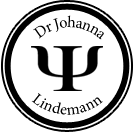Therapeutic Approaches
Through her counselling and clinical practice Johanna has gained experience in working with the following approaches:
Cognitive-Behavioural Therapy (CBT)
This approach views problems in a structured manner and helps to develop skills and techniques to gain more control in managing and addressing clients’ difficulties. Sessions are interactive and begin with identifying and clarifying the problems, then collaboratively agreeing upon “homework” tasks such as writing diaries, confronting and modifying negative thoughts, experimenting with different behaviours and noting the outcomes.
Psychodynamic Psychotherapy
This approach emphasises clients’ past history and how it impacts on their present life. By analysing the childhood the therapist helps the client to understand the causes of problematic behaviours and emotions. This includes exploring unconscious motivations, conflicting feelings, and ways of relating that can cause difficulties.
Person-Centred Psychotherapy
The Person-centred approach focuses on self-actualisation and to reach ones potential in the personal and professional life. This model stresses that the therapist adopts an attitude that includes empathy, positive regard and being “real” in the therapeutic relationship. These are qualities that I consider fundamental in all the work I undertake with my clients.
Mindfulness-Based Cognitive Therapy
Mindfulness-based cognitive therapy is a therapy that combines features of cognitive therapy with mindfulness techniques. It involves accepting thoughts and feelings without judgment rather than trying to fight or avoid them. Mindfulness-based cognitive therapy’s main technique is based on mindfulness-based stress reduction.
Existential Therapy
Existential therapy is concerned with the meaning of human existence. It looks at issues such as love, death and the meaning of life. In an existentialist approach to therapy, there are basic dimensions of the human condition. These are the capacity for self-awareness, the tension between freedom and responsibility, the creation of an identity and the establishment of meaningful relationships, the search for meaning, the acceptance of anxiety as a condition of living and the awareness of death and non-being.
Schema Therapy
Schema therapy integrates elements of cognitive-behavioural therapy, object relations and experiential therapy into a systematic approach to treatment. A schema is a stable and unhelpful pattern, which develops during childhood and then maintained throughout an individual’s life. Schemas are important beliefs and feelings about oneself and the world that are very resistant to change. The therapy here helps clients to stop using maladaptive coping styles, overcome their early schemas and improve their relationships with others.
Integrative Psychotherapy
This is a unifying form of psychotherapy that responds appropriately and effectively to the person at the affective, behavioral, cognitive, and physiological levels of functioning, and addresses as well the spiritual dimension of life.
Solution Focused Brief Therapy
This approach focuses on identifying clients’ strengths and making the best use of their resources to address current problems.
